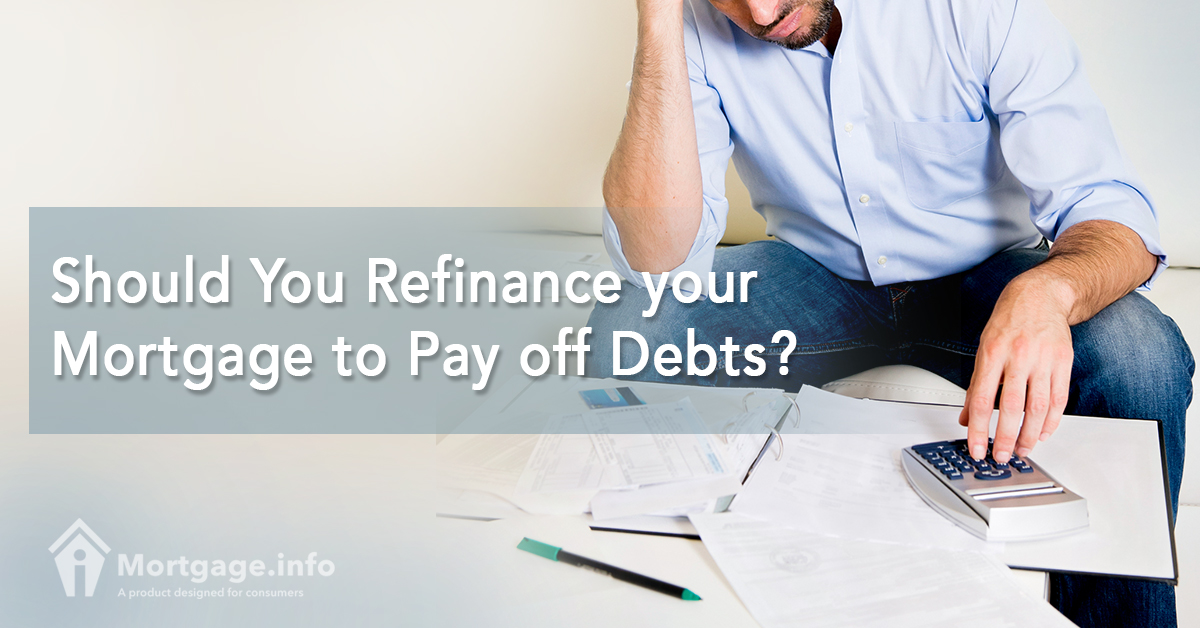Whether or not you should refinance your mortgage to pay off debts is a personal decision that requires the evaluation of many factors. First and foremost, you need to know the value of your home. Do you have the equity to wrap your debts into your mortgage without exceeding an 80% loan-to-value ratio? Even if you chose to take out a home equity loan rather than wrapping everything into your first mortgage, most lenders only allow an 80% LTV, so the largest factor is the value of your home.
Look at your Payments before You Pay off Debts
Once you know that your home is worth enough for you to wrap your debts into your mortgage, you can start to figure out if it makes financial sense to refinance your mortgage. Start by looking at each payment individually. Write down each credit card bill, the total amount owed as well as the minimum payments. Next, write down your mortgage payment as it is now. Add up the total of all of these payments.
Your next step is to figure out your new mortgage payment based on the new mortgage with your debts wrapped into it. Write down the principal, interest payment, and compare it to the total of the above debts. Is it higher or lower? If it is higher, how much higher is it? If it is lower, how much money will you save each month?
Look at the Term
You also need to consider the term of the new mortgage you would use to pay off debts. Is it a new 30-year term? How much time have you already spent paying on your current mortgage? If you originally held a 30-year mortgage and it has been 5 or 6 years, you might want to reconsider taking out a new 30-year term. Can you afford a 25-year or 20-year term? These avenues are worth exploring so that you can determine not only the most affordable route now, but also what it will cost you in the end. If you stretch a term out to 30 years again, you agree to pay more interest. You need to see how this plays out in the end.
What is your Credit Score?
Your credit score plays a role in whether you should refinance to pay off debts. There is more to it than whether or not it allows you to obtain approval for your loan. If you refinance your debts into your mortgage, paying the credit card debts off completely, your credit score could increase. This could help you in the long run. The fewer debts you have, the higher your score may become. In addition, the lower your utilization rate, which is the amount of outstanding debt compared to what your credit line, the higher your credit score might climb. If you have a questionable credit score, this could help tremendously if you can find financing.
Tax Advantages with a Mortgage
There are tax advantages that you can gain with a mortgage rather than credit card debt. Typically, you can deduct mortgage interest on your taxes. Of course, only your tax professional can determine if you are eligible to deduct your interest, but a majority of Americans are able to do so. Credit card interest, on the other hand, is not tax deductible no matter how you look at it. This benefit alone is enough for many people to consider refinancing to pay off their debts.
Consider the Closing Costs
When you look at the factors that help you determine if you should refinance or not, do not forget about the closing costs. These take away from the savings you would reap from your refinance. If you plan on staying in your home for a long time, though, it could pay off in the long run. You can also shop with various lenders to find the lowest closing costs or negotiate with one lender to get the costs as low as possible. Just do not overlook the role the closing costs play in the decision to refinance or not.
Avoid Going Over an 80% LTV
The one rule that affects everyone is to avoid going over an 80% LTV on a first mortgage. If you do this, which most mortgage programs would not even allow with a cash-out refinance, you have to pay Private Mortgage Insurance. This premium could get costly, which could take away from the benefits of paying off your debts. When you compare the costs by writing down each bill and the subsequent costs, make sure you include PMI if it is applicable in your situation in order to determine if it is the right choice for you.
The cash-out refinance to pay off debts often makes sense, especially when you pay 15% or higher on your credit cards, as many people do. You will not know if it is the right choice for you, however, until you write it all down and look at the big picture. Look to see how much you will save in the long run and how it affects you in the long run. Including PMI, closing costs and the extended term in your decision will help you make the right choice for you.

